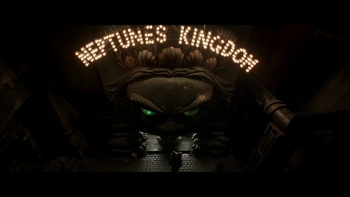 Most critics began their writeups of this film with the elementary and idiotically middle-minded question: “What if you woke up [in our main character’s situation]?” Well no surprise, me: I’d freak out, find a hole to crawl in, and stay there. As would you, fictional meta-critic I made up for this intro. But then, we’re not the protagonist of Dark City. Or are we really? And if not, then just what are we? The sum of our experiences? Take those from us and what’s left? Emotions? Sense impressions? Souls? Some interior sense of justice and injustice? Is there anything within our beings that makes us uniquely us? What is it, then? And when will some anonymous Chosen One rise from out the bewildered herd to educate us and our body-snatching, pale-faced, alien masters?
Most critics began their writeups of this film with the elementary and idiotically middle-minded question: “What if you woke up [in our main character’s situation]?” Well no surprise, me: I’d freak out, find a hole to crawl in, and stay there. As would you, fictional meta-critic I made up for this intro. But then, we’re not the protagonist of Dark City. Or are we really? And if not, then just what are we? The sum of our experiences? Take those from us and what’s left? Emotions? Sense impressions? Souls? Some interior sense of justice and injustice? Is there anything within our beings that makes us uniquely us? What is it, then? And when will some anonymous Chosen One rise from out the bewildered herd to educate us and our body-snatching, pale-faced, alien masters?
These are Dark City‘s primary questions, and its heartfelt concern for them is (poignantly, and for once) not buried under a multi-million dollar marketing campaign or a barrage of Hong Kong Action Movie tricks…unlike certain other, more popular, and much more expensive films that utilize essentially the same plot, and attempt (haphazardly, almost as an afterthought) to address the same questions. But fuck The Matrix. Much as I love it, thanks to Dark City I cannot prostrate myself before it. Buy the ticket, take the ride, and I’ve been on this ride for over a year. So good job, Wachowskis: now tell me something I don’t know.
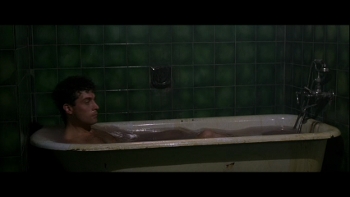 At Dark City‘s opening, we know as little as our protagonist (Rufus Sewell), who wakes in lukewarm hotel bathtub with no memory of who he is or how he came to be there. The driver’s license in his pocket says his name is John Murdoch. A mysterious phone call from Kiefer Sutherland, and the dead hooker on the floor with the Fibonacci spirals etched into her flesh, tell him some Five Alarm shit is going on. A hasty exit might be the most pragmatic course of action. We follow John’s aimless wanderings around the titular City for several scenes…until a gang of strange men in black start to chase after him. Since none among them is Will Smith, John makes the safe assumption that they must be Evil . Chopping one open reveals this to be a prudent assumption. Hell, they aren’t even human. But if the strange, telekinetic powers John manifests during this initial chase scene are any indication, Our Protagonist ain’t exactly Joe Normal either.
At Dark City‘s opening, we know as little as our protagonist (Rufus Sewell), who wakes in lukewarm hotel bathtub with no memory of who he is or how he came to be there. The driver’s license in his pocket says his name is John Murdoch. A mysterious phone call from Kiefer Sutherland, and the dead hooker on the floor with the Fibonacci spirals etched into her flesh, tell him some Five Alarm shit is going on. A hasty exit might be the most pragmatic course of action. We follow John’s aimless wanderings around the titular City for several scenes…until a gang of strange men in black start to chase after him. Since none among them is Will Smith, John makes the safe assumption that they must be Evil . Chopping one open reveals this to be a prudent assumption. Hell, they aren’t even human. But if the strange, telekinetic powers John manifests during this initial chase scene are any indication, Our Protagonist ain’t exactly Joe Normal either.
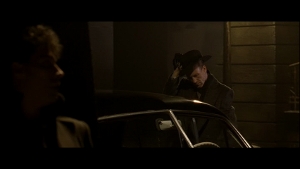 Finding his wife, John learns that not only does he have a wife named Emma (played by Jennifer Connelly – Go, you, Johnny-boy), but that she was unfaithful to him at some point in the past he can no longer recall. She also tells him of his doctor, Daniel Schreber (Kiefer Sutherland), and how a quick sit-down with Dr. Schreber might also be a good idea. John departs to assimilate this. On the one hand, she could be lying. On the other hand, infidelity can turn people into murderous madmen. But John’s not a murderer. Or is he? That dead hooker (and the string of them appearing around the City these past few nights) might be his work…or the work of those “men” he just escaped.
Finding his wife, John learns that not only does he have a wife named Emma (played by Jennifer Connelly – Go, you, Johnny-boy), but that she was unfaithful to him at some point in the past he can no longer recall. She also tells him of his doctor, Daniel Schreber (Kiefer Sutherland), and how a quick sit-down with Dr. Schreber might also be a good idea. John departs to assimilate this. On the one hand, she could be lying. On the other hand, infidelity can turn people into murderous madmen. But John’s not a murderer. Or is he? That dead hooker (and the string of them appearing around the City these past few nights) might be his work…or the work of those “men” he just escaped.
While all this spins through his head, time stops. Cars, trains, people; all fall like broken toys. Like a world ruled by the Fairy Godmother’s mad bitch of a sister, the entire city falls asleep at the stroke of midnight. All save John, who, in an excellent scene, revealing Sewell’s Powers of Acting, dashes about a crowded highway, shaking sleeping people out of there cars in a vain attempt to wake someone, anyone, up. Then, before he knows it, things start to change. Buildings shift and twist into new shapes. Radio towers spring up like corn stalks treated with Alec Holland’s bio-restorative formula. Apartment tenements become rich condos, and the entire city begins to swarm with those “men”.
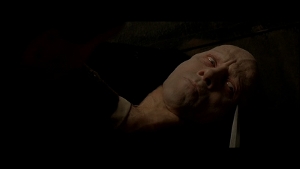 Freaked right the fuck out, John attempts to hide, and finds the good Dr. Schreber not only awake but running around with these “men”, helping them perform experiments on the City’s sleeping population. After some pummeling, Schreber explains that all this…the city, the people in it, John’s memories (or lack thereof)… is the work of what Schreber calls “the Strangers,” alien beings who use our dead as “vessels” and have the ability to alter physical matter through the telepathic machines that run under the City. Built, not on Rock-n’-Roll, but on dreams, populated by kidnapped hordes of long-forgotten origin, the City is a perfect closed system, a vast simulation. Every twelve hours the Strangers shut the whole thing down and “tune” bits of it their whim, including the memories of its ignorant inhabitants.
Freaked right the fuck out, John attempts to hide, and finds the good Dr. Schreber not only awake but running around with these “men”, helping them perform experiments on the City’s sleeping population. After some pummeling, Schreber explains that all this…the city, the people in it, John’s memories (or lack thereof)… is the work of what Schreber calls “the Strangers,” alien beings who use our dead as “vessels” and have the ability to alter physical matter through the telepathic machines that run under the City. Built, not on Rock-n’-Roll, but on dreams, populated by kidnapped hordes of long-forgotten origin, the City is a perfect closed system, a vast simulation. Every twelve hours the Strangers shut the whole thing down and “tune” bits of it their whim, including the memories of its ignorant inhabitants.
No one in this City has his or her original memories intact. Free will here is as much an illusion as the beach John keeps dreaming about. Human beings are the rats in this city-sized maze but John (of course) is different. Somehow, during the implantation of his newest life (as a serial-killing malcontent), John resisted, and wound up a blank slate. This, somehow, allowed him to inherit the Stranger’s ability to effect bits of the City with his mind.
Words cannot genuinely describe this film in anything other than a dry, analytical way, killing it dead as a butterfly pinned to a specimen board in one of the Smithsonian’s drawers. Nevertheless, we must try. And a good deal of its incomunicability flows from director Alex Proyas’ highfalutin’ style. By fusing a comic book sensitivity to striking images with heavy nods toward German impressionism and film noir, Proyas works the same magic he worked in The Crow, creating a sense of urgent movement that hauls the viewer through the twists and turns of David Goyer and Lem Dobbs’ plot.
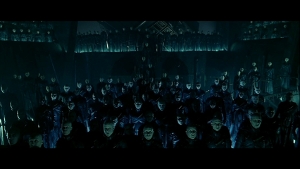 Indeed, Goyer, Dobbs and Proyas have hit upon a story that renders traditional film tropes like characterization less than useless. John Murdoch’s past is not the point of all this, despite its pulling double shifts as both a MaGuffin and a climactic reverser (sorta, kinda, spoiler alert). This in no way discourages the actors from giving their best. William Hurt, for example, is a wonderful gumshoe hot on John’s trail, who for once follows Sherlock Holmes patented method of investigation all the way to its however-improbable conclusion. Connelly, despite ending up a damsel in distress, projects a quiet strength that elevates her lady-in-waiting role to a third dimension. I even believe her tears (and Connelly does has some of the best tears in the biz), just as I believe Sewell’s desperate near-madness as he succeeds in playing the non-character main character that he is.
Indeed, Goyer, Dobbs and Proyas have hit upon a story that renders traditional film tropes like characterization less than useless. John Murdoch’s past is not the point of all this, despite its pulling double shifts as both a MaGuffin and a climactic reverser (sorta, kinda, spoiler alert). This in no way discourages the actors from giving their best. William Hurt, for example, is a wonderful gumshoe hot on John’s trail, who for once follows Sherlock Holmes patented method of investigation all the way to its however-improbable conclusion. Connelly, despite ending up a damsel in distress, projects a quiet strength that elevates her lady-in-waiting role to a third dimension. I even believe her tears (and Connelly does has some of the best tears in the biz), just as I believe Sewell’s desperate near-madness as he succeeds in playing the non-character main character that he is.
The point is that action which serves as the basis of all good science fiction…all good fiction, in fact…examining what, in the argon of my favorite Philip K. Dick story, “human is.” There’s a lot of Blade Runner in Dark City‘s visual aesthetic, and comparisons between the two films abound. This only shows the illiteracy of most film critics, few of whom seem to recall Dick’s final point, the essential question of the book Ridley Scott butchered to make his oh-so-pretty film: in the electric city, what keeps humanity’s head above the technological mire we’ve built for ourselves? Did we even build it in the first place?
No, says our popular culture. It’s all those damned aliens and their technological superpowers. If only we could see through their fog of lies and wake the fuck up to the really real nature of the world. Like any of us are going to do that, or use films like this as our guideposts and watchword…apart from me, that is.
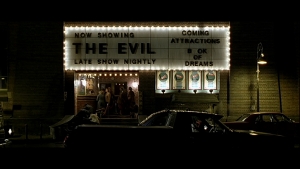 I don’t really mind the Stranger’s underdeveloped alien-ness. They look and act more-or-less like the vampires they’re meant to remind me of, yet they’re saved from being one-dimension villains by a wonderful turn from Richard O’Brien (know around these parts as Riff-Raff from The Rocky Horror Picture Show) as the aptly-named Mr. Hand. In an attempt to track John down before he wreaks the whole applecart, Mr. Hand volunteers to be imprinted with the very memories John rejected. With gleaming death in his eye, Mr. Hand sets out to ensnare humanity’s only hope with a little unwitting help from Emma and William Hurt’s character, the film’s noir-detective-alike. This bit of movie cat-and-mouse handily pads out the second act while allowing us to step behind the Stranger’s curtain of creepiness. Surprise! They’re not all that different from us, really. No more so than the Morlocks. And once again, that’s okay, because for all their advanced technology they aren’t really the point either.
I don’t really mind the Stranger’s underdeveloped alien-ness. They look and act more-or-less like the vampires they’re meant to remind me of, yet they’re saved from being one-dimension villains by a wonderful turn from Richard O’Brien (know around these parts as Riff-Raff from The Rocky Horror Picture Show) as the aptly-named Mr. Hand. In an attempt to track John down before he wreaks the whole applecart, Mr. Hand volunteers to be imprinted with the very memories John rejected. With gleaming death in his eye, Mr. Hand sets out to ensnare humanity’s only hope with a little unwitting help from Emma and William Hurt’s character, the film’s noir-detective-alike. This bit of movie cat-and-mouse handily pads out the second act while allowing us to step behind the Stranger’s curtain of creepiness. Surprise! They’re not all that different from us, really. No more so than the Morlocks. And once again, that’s okay, because for all their advanced technology they aren’t really the point either.
That Dark City not only knows this but manages to internalize it is a miracle of modern movie making in itself. All those CGI morphs and filtered cinematography are set dressing, distraction from the film’s real thrust. In an era that plucks its hot young directors from the world of advertising (including that slickest of ads, the music video) its refreshing, enchanting, and by-God heartening to find a film with even half a mind (hence the success of The Matrix). I’m even more astonished to find a film with a mind all its own. Dark City is that film, a perfect epitome of the late-20th century conflagration of science fiction and fantasy. While the ground level fans insist on segregating them, artists are working hard in the trenches to bring about their unification. This is a speculative film that, by now, you should have all seen. Because it’s just that damned good.
![]()
![]()
![]()
![]()

I dearly love this film. My only quibble with it has long been Sutherland’s opening narration, which tells us what we would have learned anyway within the first half-hour and cheats us of a good deal of the initial suspense in the process. No doubt some studio suit, dreading the notion of an audience having to think, shoehorned that in right before release…
I’m almost positive you’re correct. I’ve yet to find a major American film where opening narration is either necessary or essential. Even George Lucus stopped short of having someone speak those six opening crawls that open up the Star Wars films…it only makes real sense on television, where you still occasionally need someone to say “Previously on…” Though the age of Tivo may make even that an anachronism.
You’re right on. According to the director, it was an ignorant suit who got cold feet over the story being “too complex” for modern audiences to grasp without it being spoon fed to them. Good thing that’s been fixed in the director’s cut of the movie that’s out now.
I enjoyed your analysis of this great film, also the enthusiasm you have for it.
I’ve always seen the film as an allegory of life. Particularly humanity’s (historically) recent attempts to lift ourselves out of the mire of archaic thinking to some higher level based on our own insights and experience.
Did any of us ask to be here? Of course not. Like John we just came-to here one day and were left to deal with it. Some of us deal with it fine, others not so well. John emerges from his metaphorical womb and is rudely dumped onto the cold ground. “WTF?” is the only reasonable question under the circumstances and it’s this question that drives him.
The fact that everything gets shifted around every night mirrors our reality where the only constant is change. People rise and fall, buildings come and go, people too. They change jobs/careers, move, die or we simply lose track of them. Even our memories of specific times/places/people become blurred or distorted over time. Sometimes we forget altogether.
The aliens represent our need to believe that there is something or someone else behind it all. They are projections of the primitive mindset that defaults to god to explain everything. The fact that the aliens have the good doctor implant memories speaks to how we are indoctrinated into this religious mindset or that before we’re even able to intellectually muster a reasonable counter argument. The dead the aliens inhabit represent the religious notion of life after death, which, when you think about it is a pretty creepy notion. Corpses will rise from the ground on the day o’ judgement? Really? John’s inquisitive nature represents the scientific drive to discover what’s actually going on. John, is in fact, a stand in for Galileo; declared a heretic and persecuted for discovering that their was something beyond what holy scripture was teaching us. The Strangers are a lot like us because they are us. They’re the sum of our indoctrinations animating the corpses of the dearly departed (“Where did mommy go?” “She’s in heaven with Jesus dear. And at night, that’s her you can feel beside your bed, watching you sleep. Feel better now?”)
Once people have broken through the shell (beach) of ignorance and discovered the true nature of their situation (that we’re all floating on a rock in some indistinct part of the universe with no discernible way off and no easy explanation as to how we got here) defaulting to the god fairy tale begins to just seem like so much running from the truth and our need to keep them (our old notions) around and to give belief in them power over our thoughts and actions goes away, as do the aliens/strangers. We stop letting others tell us who we are. From now on we’ll decide. This is one of the hallmarks of enlightenment thinking (represented here of course by the arrival of the sun). In the end, John, the Enlightened man bravely moves forward to help fashion a new world, not based on fear but on the light of reason and truth.
Likewise, the stranger could just as easily represent the false ideals of science, which attempts to learn the secrets of the human soul by experiment, and succeeds only in creating a shifting world of illusion. The soul of man, bestowed by God, is the one thing the strangers (science) cannot fathom, and is the only hope for breaking out of the darkness of unnatural life they have created.
Likewise again, the strangers could represent the secularism of a culture that has rejected Christ, and carry on the impersonation of some of their values without the living soul that makes them human: they are merely dead things. When water, symbolic of baptism, strikes them, they die. John Murdock’s capture and being strapped to the gurney for his final imprint is symbolic of death; he rising in glory, the chains falling off him, now armed with power, is symbolic of resurrection. He then turns the world, symbolic of Easter, from darkness toward light, and brings forth many waters abundantly, symbolic of grace.
You see? You are reading into the tale a more or less arbitrary group of symbols and making it mean what you’d like. You can tell a sound interpretation from an unsound one by seeing how many of the symbols do not or cannot fit the rest of the movie.
I would venture to say that the story is neither atheist nor Christian, but Gnostic, a tale about a cosmic conspiracy where everything you know is false, and the power of truth is within oneself.